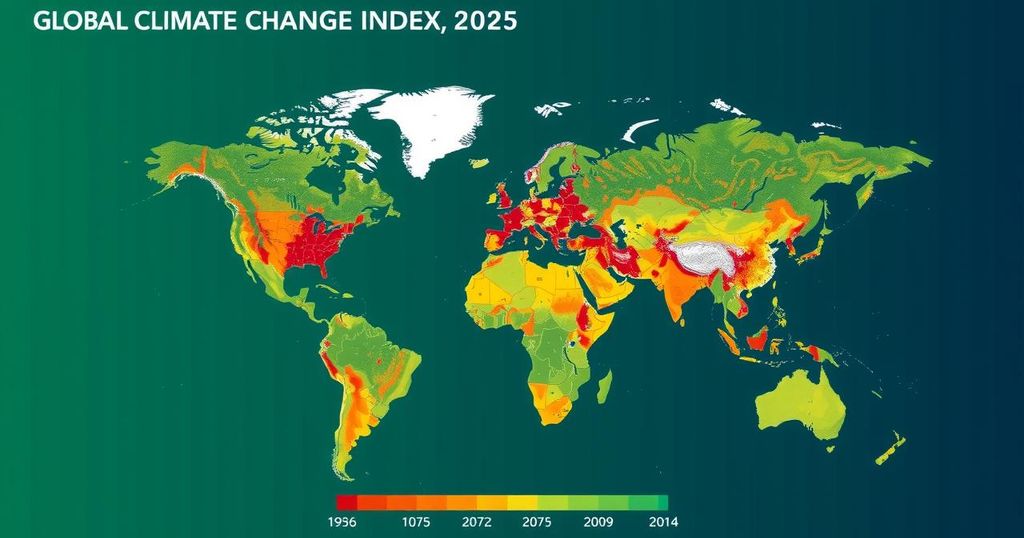Climate Change Performance Index 2025: Progress Amidst Fossil Fuel Reliance

The CCPI 2025 indicates notable renewable energy advancements among major emitters, yet many nations persist in fossil fuel dependency. Denmark leads the rankings, while Argentina, Iran, Saudi Arabia, and others lag significantly. Large emitters like China and the US display areas of concern despite renewable growth. The EU shows strength with no very low performers, emphasizing the necessity for urgent climate action across all countries to meet global targets.
The Climate Change Performance Index (CCPI) for 2025, co-authored by Germanwatch, NewClimate Institute, and CAN International, evaluates the climate performance of major emitters responsible for 90% of global emissions. This year’s report observes significant growth in renewable energy across nearly all evaluated nations; however, many continue to rely on fossil fuels, particularly fossil gas. While 61 out of 64 countries improved their renewable energy shares over the past five years, emissions trends remain stagnantly low in 29 countries. Denmark leads the rankings as the top-performing nation, although it does not yet achieve an overall very high rating. The Netherlands follows in fifth place, despite concerns regarding its new government’s climate policies. The United Kingdom achieved a notable advancement, climbing to sixth place, largely attributed to its coal phase-out and the cessation of new fossil fuel licenses. In sharp contrast, Argentina witnessed a significant decline in its performance under a new government, placing it at 59th overall. Countries at the bottom of the rankings—Iran, Saudi Arabia, the United Arab Emirates, and Russia—remain heavily dependent on fossil fuel production, with renewable energy constituting less than 3% of their energy mixes. China, the largest emitter globally, ranks 55th due to its ongoing reliance on coal, despite a robust expansion of renewable energy that signals potential for change. The United States, as the second largest emitter, is positioned at 57th, underscoring the need for more substantial investments in renewable energy and reductions in fossil fuel subsidies. Within the G20, only the United Kingdom and India performed well, while fourteen member countries were rated low or very low on emissions performance. Collectively, G20 nations are responsible for over 75% of global greenhouse gas emissions. The European Union, positioned at 17th place, is bolstered by high-performing member states, demonstrating the positive impact of the EU Green Deal, with no countries receiving an overall very low rating this year.
The Climate Change Performance Index serves as a vital tool in evaluating the commitment of major global emitters towards reducing greenhouse gas emissions and transitioning to renewable energy. Compiled annually, the CCPI assesses the performance of 64 countries, including the European Union, which collectively contribute significantly to global emissions. The index measures various parameters including renewable energy adoption, emissions reduction trends, and the efficacy of climate policies, providing an essential overview of the progress made in tackling climate change.
The Climate Change Performance Index 2025 reveals a pivotal moment in the global efforts against climate change. While numerous countries are enhancing their renewable energy capacities, significant reliance on fossil fuels remains a critical barrier, particularly in nations like Argentina, Iran, and Saudi Arabia. The strong performance of Denmark, the UK, and India illustrates that meaningful progress is possible, but comprehensive and accelerated action is needed, particularly from the world’s largest emitters. Consensus and commitment across all countries will be essential to effectively address the pressing challenges posed by climate change.
Original Source: newclimate.org






